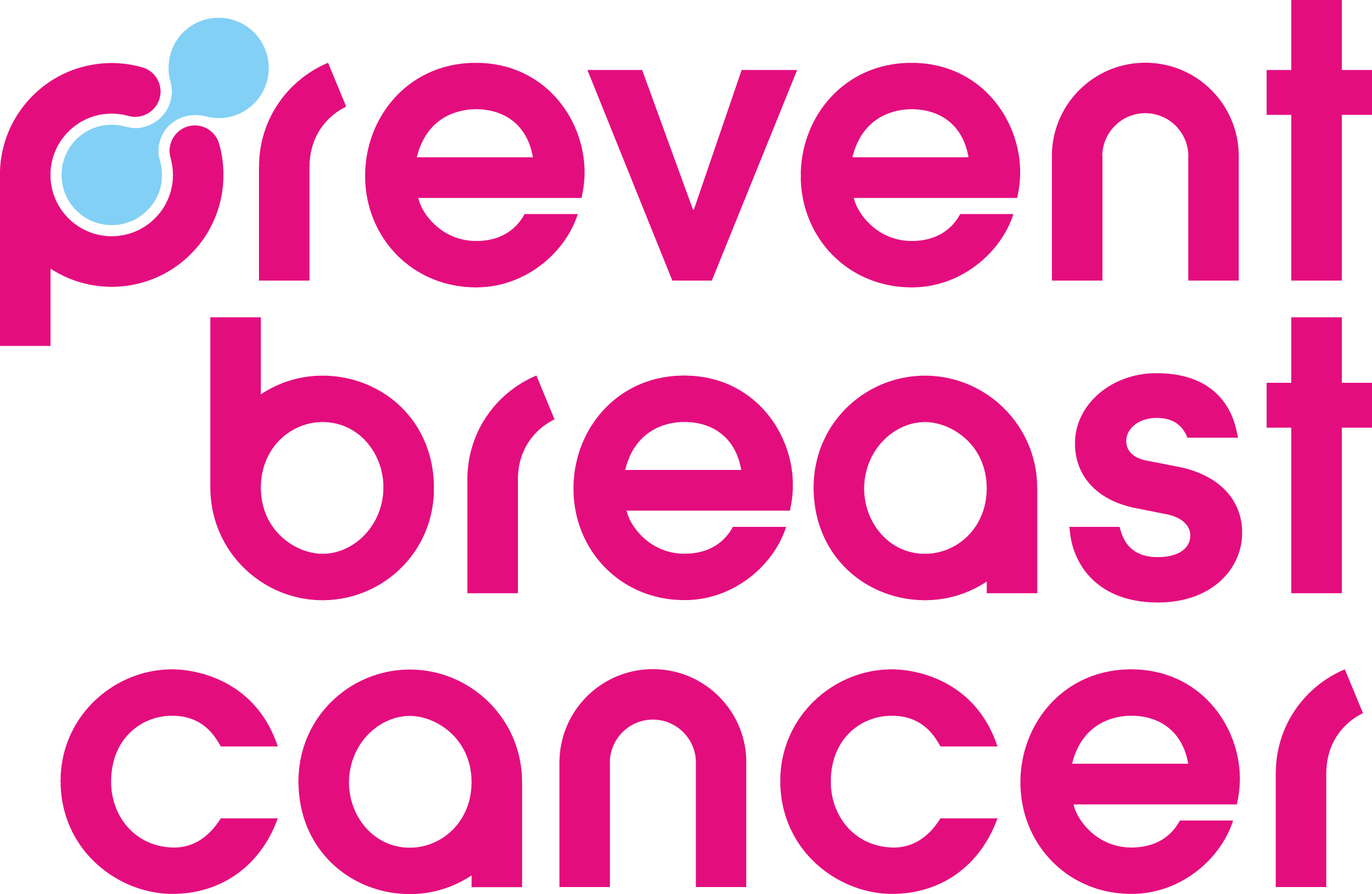Research Projects
Prevent Breast Cancer funds high quality research into the prediction and prevention of breast cancer.

Find out more about Prevent Breast Cancer’s current breast cancer research projects and latest findings. On this page you can find information:
Current Research
Risk Reduction: Effects of preventive tamoxifen on high-risk breast microenvironment
In this study, we will compare the make-up of breast tissue from women in clinical trials before and after they take preventative drugs, in order to find markers of whether women are responding or not. This research will enable us to better understand why preventative drugs are effective in some women but not in others. As a result, we will be able to better tailor prevention treatment to individual women, which could mean that many women are spared from unnecessarily experiencing tamoxifen’s challenging side effects.
Gene Research: Breast cancer in women under 50
This study aims to improve risk estimates for breast cancer in younger women, which is typically more aggressive and has differing risk factors to post-menopausal breast cancer. Using genetic testing, this study hopes to develop a more accurate way of predicting a patient’s risk of developing breast cancer and comparing this to existing risk estimates to see which is better for younger women with breast cancer. This research will aid development of new therapies that harness the immune system and improve outcomes for younger breast cancer patients.
Preventative Drugs: Investigating prevention using a human tissue ex-plant model
In our previous research, we have developed an ex-plant model (small tissue fragments based on the human breast) which allows fragments of human breast tissue to be cultured in the lab. This follow-on project will carry out in-depth studies to investigate how similar our ex-plant models are to matching samples of breast tissue collected from clinical prevention trials and how they respond to treatment. Our lab-based model, when fully verified, can provide a platform to test new prevention treatments for women who are at a high risk of breast cancer.
Early detection and screening: Predicting outcomes using microsimulation
This project looks at improving early detection and breast cancer screening by using microsimulation, a computer programme that analyses data, to predict screening outcomes. Microsimulation models can be used to answer complex questions about screening without the need for costly and impractical clinical trials, which will improve patient outcomes through an efficient use of resources. This research has the potential to improve the NHS breast screening programme by building on current trials investigating screening strategies in women with high breast density.
Risk reduction: Alcohol consumption and increased breast cancer risk
This project will build on our previous research and investigate the best ways to increase awareness of the link between alcohol and breast cancer. We will identify specific tools to help mid-life women drink less, including positive ways to frame health messages. The project will consist of a public advisory group to review past findings, a survey to rate potential intervention content, a tested prototype version of the intervention and a wide-reaching public communication strategy.
Research Findings
DNA Saliva Test
Prevent Breast Cancer scientists and their colleagues have identified over 300 DNA fragments which affect breast cancer risk. They also developed a simple saliva test to detect them, which will help to quickly determine each woman’s risk of developing the disease.
Preventative Drugs
Preventative drugs are a key research area for Prevent Breast Cancer. In some cases, people with a high risk of developing breast cancer may be able to take certain medications in order to make it less likely that they will get the disease in future.
Risk Adapted Breast Screening
Studies were carried out to assess the effectiveness of risk adapted breast screening in the UK and Europe (MyPebs) and of the Family History Risk and Prevention Clinic (FH-Risk) in improving outcomes for women with a high risk of developing breast cancer.
Gene Research
Gene research is the study of DNA to find out what might lead to people developing breast cancer. Genes are short sections of DNA that are inherited, meaning that if you have a family history of breast cancer, this can increase the likelihood that you will also develop the disease. In certain cases, gene mutations – or an alteration in the DNA sequence – can lead to a very high risk of breast cancer that is passed down through generations of family members, such as the BRCA1 and BRCA2 mutations.
Research funded by Prevent Breast Cancer aimed to find out more about which other genetic factors can increase the risk of developing cancer. The overall aim was to improve the breast screening process, so women know their personal risk of developing the disease.
SNPs (Single Nucleotide Polymorphisms)
SNPs are small DNA fragments that our research has proved to be a valid predictor of the risk of developing breast cancer. In total, over 300 of these tiny but significant gene fragments have been discovered by our research team, who have developed a simple saliva test to detect them. Research has shown that around 28% of hereditary breast cancers can be attributed to SNPs variations and they are predicted to account for more once further research has been undertaken. SNPs are far more commonly found than known gene mutations (for example, BRCA1 and BRCA2 account for around 20%), making them an incredibly important for identifying someone’s breast cancer risk. Our hope for the future is that SNPs testing will form part of the NHS screening programme, and help to predict a woman’s particular breast cancer risk.
BRCA
Previous Prevent Breast Cancer funded research involved women who had undergone genetic testing and were confirmed as carriers of the BCRA1 or BRCA2 gene. Research showed a major benefit from undergoing risk-reducing surgery, particularly removal of the ovaries and fallopian tubes which reduces the risk of both ovarian cancer greatly and breast cancer by about half. The study showed that women who have any form of risk-reducing surgery had increased survival compared to those deciding against an operation (e.g., relying on MRI screening alone). Life expectancy was almost normalised in those that underwent surgery but substantially reduced in those who did not.
Replication of human breast tissue to test drugs on
In 2019 our researchers developed a complex replication of human breast tissue enabled them to undertake large scale testing of preventative drugs. The model so closely resembles real breast tissue that it even mimics mammographic density, an important breast cancer risk factor. Our scientists used this model to identify the best drugs to take directly into clinical trials, speeding up the process and avoiding animal testing.
Improving the accuracy of genetic testing
Our researchers found a mechanism by which the important BRCA1 gene no longer functions in certain families, which is called epigenetic silencing and isn’t detected in current gene tests. Future research would test whether this is also happening with the genes BRCA2 & PALB2, so that affected families can gain access to appropriate treatment methods, support, and avenues for prevention.
PROCAS
Prevent Breast Cancer’s PROCAS (Predicting the Risk of Cancer at Screening) study was launched in 2009 and will revolutionise NHS breast screening by predicting a woman’s individual risk of breast cancer at the time of her mammogram. Risk is calculated based on breast density, family history and lifestyle. We would also like to see SNPs testing as part of the breast screening process. Those found to be at higher risk will be provided with advice and support and where appropriate, offered options including more frequent mammograms, preventative drugs and surgery. The hope is that this more sophisticated approach to screening will be rolled out across the UK in the near future.
Anti-clotting drugs
The most common cells found in the tissue surrounding breast ducts and lobules are called fibroblasts. Our research team has previously found that these cells are involved in blood clotting and are related to increased breast density as well as increased risk of developing early-stage breast cancer. Breast density is the second biggest risk factor for developing breast cancer, after age₈.
Breast cancer resembles a non-healing wound, with increased clotting in breast tumours. Future research is now required to prove whether the fibroblasts in high density tissue create an environment, which increases clotting and causes normal breasts to develop breast cancer and benign cases of pre-cancer to become invasive.
Anti-clotting drugs could drastically reduce the risk of breast cancer in many women if fibroblasts do play an important role.
Anti-prolactin drugs to target the hormone prolactin
In 2013, the National Institute of Clinical Excellence adopted our recommendation that the drugs tamoxifen and raloxifen be used to help high risk women reduce their risk of developing breast cancer. Unfortunately, these drugs have difficult side effects, so our researchers worked to identify preventative medication that is more effective, well-tolerated and safe.
In 2019, they investigated whether targeting the hormone prolactin could stop the disease before it starts, which could lead to anti-prolactin drugs being used to reduce breast cancer risk. As this medication is currently used to treat the disease, it is known to be safe and without significant adverse side effects. Results suggested that there are differences in hormone signalling in some women. Further research will test whether this makes cancer more likely to develop and if inhibiting the key hormone pathways could lead to effective and safe new drugs.
Early Detection and Screening
Screening is essential to ensure that breast cancer is caught as early as possible, and that people are provided with the treatment that is right for them. Until we can completely prevent the disease we will continue to undertake high-quality research into improving the screening process for breast cancer.
Establishing why higher breast density causes cancer
High breast density is the most significant risk factor for breast cancer after age. It can mean that a woman is six times more likely to develop the disease.
Breast density refers to the supportive tissue around cells in the breast, known as extra-cellular matrix (ECM). An important component of ECM is collagen, which give a “stiffness” to the breast tissue, and breasts with dense ECM show up as whiter on mammograms.
Our scientists worked on lab-based projects to try and understand why high breast density is such a significant indicator of risk. They have discovered that denser breast tissue is subject to higher levels of DNA damage, leading to harmful cell signals getting through, and so affecting cancer risk.
Risk Reducing Research
Experts estimate that 25-30% of breast cancers can be prevented through making lifestyle changes such as reducing your alcohol intake, eating healthily and losing weight. Prevent Breast Cancer researchers have previously found that despite this, many women whose family history puts them at a high risk of the disease are overweight and have a high alcohol intake. Although high-risk women can visit Family History Clinics for information and potentially increase the frequency of their mammograms, very little support is given to help these women make positive, long-term changes to their lifestyles.
In 2018, our Family History Lifestyle Study recruited 210 women with a high risk of breast cancer to support and empower them to make positive changes to their diet and lifestyle. The research team hope that a healthy lifestyle programme will be adopted by the NHS, helping to stop breast cancer from developing in high-risk women.
About Prevent Breast Cancer
Prevent Breast Cancer is the only UK charity entirely dedicated to the prediction and prevention of breast cancer – we’re committed to freeing the world from the disease altogether. Unlike many cancer charities, we’re focused on preventing, rather than curing. Promoting early diagnosis, screening and lifestyle changes, we believe we can stop the problem before it starts. And being situated at the only breast cancer prevention centre in the UK, we’re right at the front-line in the fight against the disease. Join us today and help us create a future free from breast cancer. If you have any questions or concerns, email us today.
on January 10, 2023.
on January 1, 2023.



